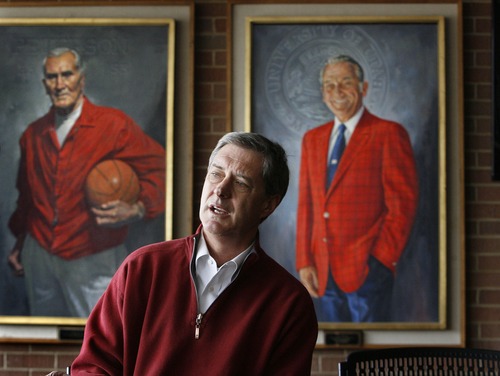This is an archived article that was published on sltrib.com in 2013, and information in the article may be outdated. It is provided only for personal research purposes and may not be reprinted.
When the University of Utah's Board of Trustees approved the school's move to the Pac-12 Conference, then-chairman Randy Dryer told Ute athletic director Chris Hill, "This will cement your legacy here — not that you're getting ready to die."
Three years later, that legacy — and, more to the point, Hill's job — are subject to the findings of independent investigators. They've been commissioned by Utah President David Pershing to examine how Hill and other administrators handled allegations of athletes being mistreated by Greg Winslow, who's out as the Utes' swimming and diving coach.
If Salt Lake City attorney Alan Sullivan and Michael Glazier, a former NCAA staff member who consults on legal issues with athletic departments, determine that Hill knew what was happening and failed to respond, he's in trouble.
Anything short of that — even findings that Hill should have known what was going on — would enable him to keep the job he's held for 25 years while adjusting some policies and procedures.
Hill, whose title includes "special assistant to the president," is so well established and so well perceived on this campus that the swimming program is not going to take him down.
Not that he shouldn't be worried, because these are serious allegations and nobody's exempt in this business. Athletic director Gene Bleymaier, who built Boise State's football empire, was fired after 30 years at the school as a result of NCAA secondary violations.
But that could happen to Hill only if the investigation proves he was aware of major issues and ignored them.
Asked if he views himself as being on trial, Hill said, "From my reality, in my chair, it's so important that we spend time figuring out what goes on. That's my focus right now. My focus is where we want to be with our student-athletes."
The allegations regarding Winslow "have called into question the university's processes," Pershing said.
That's why Hill asked Pershing to hire outside investigators, to determine "if we didn't do enough," Hill said Monday, during a series of interviews. "Who knows? We may have [procedures] better than we thought or not as good as we thought."
That last part is the probable finding. Hill's defense likely is based on a breakdown in the chain of command from Pete Oliszczak, formerly Utah's senior associate athletic director in charge of swimming and diving, to Hill. Oliszczak left the school in November.
Speaking generally of the department's structure, Hill said, "That's a fine line in administration. You want to rely on people as much as you can and trust them. At the same time, it's kind of, when do you jump in and when do you not? At the end of the day, I'm responsible for the [staff]."
So the factors in Hill's favor include Oliszczak's departure, his suspension of Winslow last month after the school learned of potential sexual abuse charges in Arizona and Hill's history of caring about Utah's 400 student-athletes. In 2004, the Utes' former golf coach was asked to resign, soon after five golfers complained about him drinking and driving on their way to a tournament.
Hill merited less praise for his handling of former basketball coach Rick Majerus. A lengthy Sports Illustrated profile of Majerus, several years after his Utah tenure, portrayed Hill as somewhat oblivious to Majerus' treatment of players.
Ultimately, what matters now is the investigation's findings. Hill professes to be eager to get the results and determine "what corrective measures we may have to make."
During the news conference celebrating Utah's Pac-12 move, Hill said, "In athletics, we all need to be dreamers with no limits and no rear-view mirrors."
In this case, a look back certainly is in order.
kkragthorpe@sltrib.comTwitter: @tribkurt



